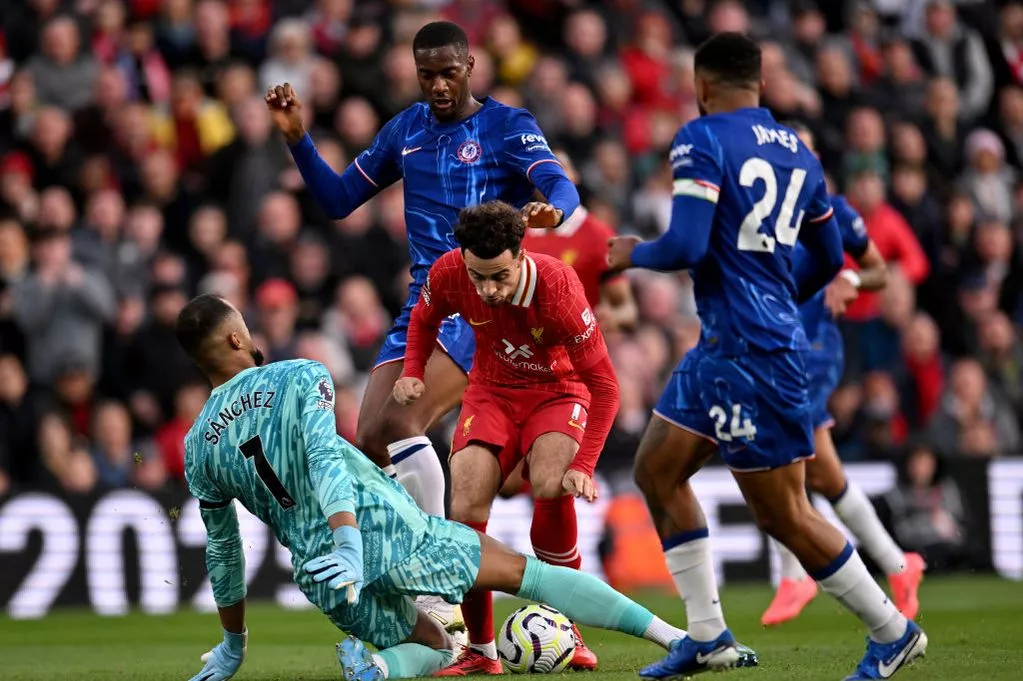Chelsea were informed that their 2-1 defeat to Liverpool on Sunday was handled correctly by a combination of VAR and referee John Brooks. Despite the controversy surrounding several key moments in the match, officials stood by their decisions. This defeat, which came with its fair share of drama, left Chelsea and their fans frustrated, especially in light of the contentious calls that significantly shaped the outcome.
The game itself saw Liverpool take the lead through Curtis Jones, whose goal provided an early advantage for the Reds. Chelsea, however, responded swiftly, with Nicolas Jackson equalizing shortly after the break. Initially, Jackson’s goal was ruled offside, leading to immediate frustration from the Chelsea camp. But after a thorough review by VAR, the decision was overturned, and Chelsea’s celebrations were back on track. It felt like a pivotal moment in the game, but it wasn’t to be the defining one.
Liverpool soon restored their lead, once again courtesy of Jones, who found the net for a second time. As the match progressed, Chelsea enjoyed plenty of possession and attempted to create chances, but they lacked the cutting edge needed to break through Liverpool’s defense. Their efforts often fell short, with no clear-cut opportunities materializing in the final third.
One of the match’s most controversial incidents occurred when Jadon Sancho went down in Liverpool’s box following a clash with Trent Alexander-Arnold. Chelsea supporters immediately called for a penalty, hoping that VAR might intervene. However, to their dismay, neither the referee nor VAR deemed the contact sufficient for a penalty. Former Premier League referee Dermot Gallagher was quick to defend the decision, stating, “I didn’t think it was a foul. Both players are tangled, and I would be very surprised if that was given as a penalty.” Gallagher’s backing of the officials left little room for debate, as he maintained that the right call had been made in this instance.
Another critical moment came when Chelsea defender Levi Colwill was penalized for a foul on Curtis Jones inside the box, leading to a Liverpool penalty. Gallagher weighed in on this incident as well, fully supporting the decision. “It’s a penalty; he doesn’t get the ball and catches him on the shin. The referee had the perfect view,” Gallagher explained. The clarity of the foul left little room for argument, and Liverpool took full advantage of the resulting penalty.
Yet another debated call saw Jones go down after contact with Chelsea goalkeeper Rob Sanchez. Initially, it appeared that Liverpool would receive another penalty, but after a VAR review, the decision was overturned. Once again, Gallagher backed the officials, explaining, “The goalkeeper clearly gets the ball first, and Jones runs into him.” The VAR review proved pivotal in this case, sparing Chelsea from a potentially game-ending blow.
There was also an incident involving Liverpool’s Mohamed Salah in the first half, which sparked calls for a booking due to what some believed was a dive. Pundit Gary Neville was among those calling for Salah to be punished, but Gallagher had a different view. He explained that Salah had simply slipped as he was about to strike the ball, dismissing the notion of simulation. “It wasn’t a dive; Salah lost his footing,” Gallagher clarified.
Towards the end of the game, Chelsea’s Tosin Adarabioyo was lucky to escape with just a yellow card after a foul on Diogo Jota. Gallagher offered insight into why the referee opted not to show a red card. “Jota wasn’t in possession of the ball, and Colwill was in a position to challenge, so it became a footrace,” he said. Gallagher also pointed out that the ball was moving away from the goal towards the corner flag, meaning that even if Jota had reached it, his angle on goal would have been unfavorable. “There were too many factors at play to justify a red card,” Gallagher concluded.
After the match, Chelsea manager Enzo Maresca remained tight-lipped about the controversial decisions that had defined the game. Speaking in a post-match press conference, Maresca was evasive, refusing to delve too deeply into the referee’s calls. “The referee’s decisions have been clear for you, for me, and probably for all of you,” he stated, offering little in the way of criticism or support. When pressed further, Maresca simply added, “The referee is responsible for making decisions. Sometimes they’re correct, and sometimes they aren’t. There’s nothing more to say.”
In the end, despite Chelsea’s frustration with some of the decisions that went against them, it was clear that the match officials stood by their calls, with VAR playing a significant role in ensuring that contentious moments were thoroughly reviewed. The Blues may feel hard done by, but the outcome of the match ultimately came down to their inability to capitalize on their chances, while Liverpool took advantage of the opportunities that came their way.
